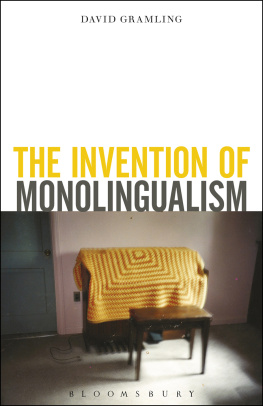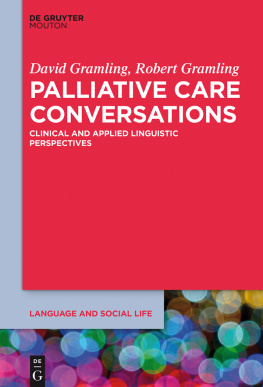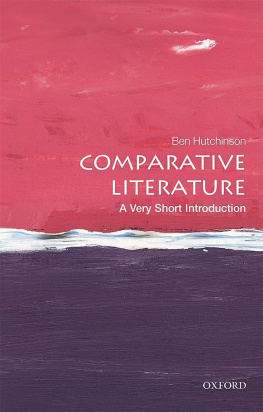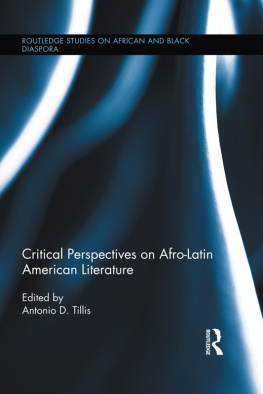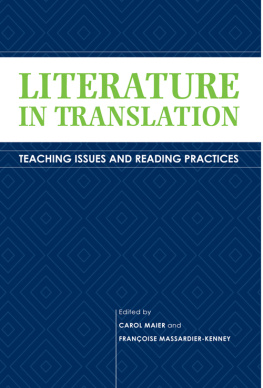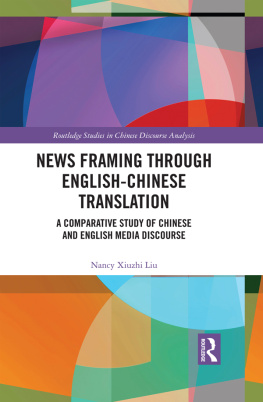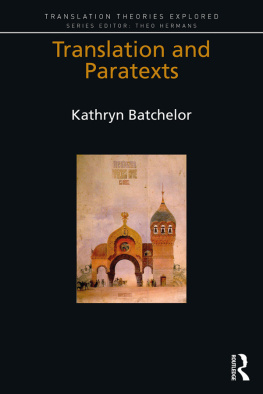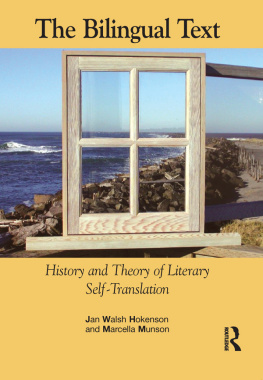THE INVENTION OF MONOLINGUALISM
For Louise
(19112010)
THE INVENTION OF
MONOLINGUALISM
David Gramling
Bloomsbury Academic
An imprint of Bloomsbury Publishing Inc
C ONTENTS
A desire to write this book first set in during the Vermont winter of 19945, in the form of a vague shiver. I was immersed in an undergraduate liberal arts culture that prized foreign language learning, as a matter of pride as much as one of profit.
It was during that winter, while reading Eve Kosofsky Sedgwicks book The Epistemology of the Closet , that I first read a scholarly account of how certain structures in North Atlantic modernity had been able to ensure crucial, unearned triumphs for geopolitical brinkmen like U.S. President Ronald Reagan, thanks alone to their mono lingualism . Right there on its opening pages, Sedgwicks book was making an intervention about monolingualismjust without naming it for us in that fashion. Knowledge, after all, is not itself power, she wrote, although it is the magnetic field of power. Ignorance and opacity collude and compete with knowledge in mobilizing the flows of energy, desires, goods, meanings, persons (2008: 4).
The logic was simple and saddening, there on the page. Hadnt everything else in my educational life urged me toward a contrary Certainly, if Mr. Reagan had been so routinely able to manhandle the world by dilating in his native [language] (Sedgwick 2008: 4), such a scandal couldnt simply be chalked upcould it?to cest la vie or it is what it is . Something must have been, or become, quite amiss.
But why was I learning about adverse multilingualism and the structural privileges of the monolingual speaker from a primer on queer theory, and not from scholarship more squarely interested in language learning? If I had myself been raised multilingually, Id have surely encountered the brute power of monolingual privilege by my first morning of kindergarten, as several of the other girls and boys in my Central Massachusetts elementary school had done. But I had not. The closest Id come to foreign languages in childhood was hearing my mothers stories about conjugating Latin for the nuns at Holy Family School in the 1950sam o, am as, am at punching each final syllable like a faulty brake pedal. These multigenerational memories of hangdog and inspirationless foreign language non-learning became, in a sense, my own mother language.
Neither did my wondrous college professors of foreign languages and literatures, afire as they were with philological, post-structuralist, and reflexive anthropological lines of thought, care much to talk about the former president and his disconcertingly effective monolingualism. For young researchers in language studies like me, there were few books, classes, or essays to turn to about monolingualism, and today still there are almost as few. Monolingualisms persistent non-place in humanities and social science research methodologyeven amid the boom in multilingualism and translation studies todayportends that students of monolingual phenomena will need, for the time being, to keep our treasures hidden in our neighbors house, as my dear translator friend Aron Aji says.
In other words, critics of monolingualism (as opposed to criticizers of it, who are always and everywhere votre service ) will continue to forge our tools in the neighboring houses of literary studies, applied linguistics, political theory, linguistic anthropology, foreign and additional language pedagogy, classical, medieval and Renaissance studies, jurisprudence and legal studies, critical race studies, information technology, translation studies, psychology, mathematics, music history, and indeed queer theory. This is good, and it reminds us to be good guestsvisitors who dont misuse, misinterpret, or run off with things our disciplinary hosts hold dear. A number of scholars have already done this well, dedicating a great portion of their writing lives to the explicit and sustained study of monolingualism. They are few enough that I can thank almost all of them by name, for their profound and palpable influence on this book: Wolfgang Butzkamm, Elizabeth Ellis, Ingrid Gogolin, Brian Lennon, Till Dembeck, Thomas Paul Bonfiglio, Mary Louise Pratt, Rey Chow, Anjali Pandey, and Yasemin Yildiz. Though it feels immodest to thank Jacques Derrida for anything, there is also genuine gratitude in these pages for his indelible work, in and before Monolingualism of the Other (1996) .
While writing this book, I have been guided, advised, cheered, and offered critical friendship by many treasured friends. I thank them here not from a to z , but in accordance with the simple ways they come to mind every day, always just in time. Thanks to my wise, big sisters in scholarship Chantelle Warner, Sarah Richardson, and Alison Phipps; thanks to my co-translators lker Hepkaner, Kristin Dickinson, and Aron Aji for their generous sohbet about translating Turkish poetry and fiction; thanks to my advisers and mentors Claire Kramsch, Deniz Gktrk, Anton Kaes, Nikolas Euba, and Roman Graf for taking a longer view than I could; thanks to my supportive and forbearing departmental colleagues in German Studies at the University of Arizona; thanks to my graduate and undergraduate researcher colleagues for their vision, commitment, and rejuvenating conversation over the course of this project, particularly to Tara Taylor, Kerry Marnell, Lana Baeumlisberger, Judith Menzl, Nicholas McNutt, Kyung Lee Gagum, Summar Alsemeiry, Osman Can rnek, Diane Richardson, Charles Norton, Nurulhude Baykal, Christina Butler, Kristen Michelson, Keri Miller, Mija Sanders, Patrick Ploschnitzki, Carolin Radtke, and Benjamin Horn; thanks to my enlightening comrades in multilingualism scholarship Katja Frimberger, Till Dembeck, Glenn Levine, Gameli Tordzro, Naa Densua Tordzro, Ganyamatope Tawona Sithole, Jerry Won Lee, Peter Ecke, Malena Samaniego, Kamakshi Murti, Bethany Wiggin, Giulia Radaelli, and Martina Schwalm; thanks to my beautiful mother and very handsome brother, Kathryn Gramling and Robert Gramling, whose dissertations in nursing and public health were the only ones Id read before writing my own; thanks to those who stuck by me as best they could when it dont come easy: Russell Wagner, Elena Taylor-Garcia, Anne Moore, Julie Koser, Don Eggert, Jamilah Shubeilat, Susan Stryker, William Coker, Tes Howell, Aurora Choi, Bruce Cole, Ben Reynwar, Liz Crockett-Hixon, Samuel Ace, TC Tolbert, Lindsay Slabich and Kristen Mara, Benj Lipchak, Joseph Watson and Michael Warner, Rich and Beth Nobile, Mehtap Syler, Ginny and George Lewis, Flint Freeman, Graziano Paolicelli, Christopher Moes, and Heike Fahrenberg. I would like to thank the supportive colleagues at Fakenham Prepress and Bloomsbury, most whom Iver never met, who helped get this manuscript ready for reading: Haaris Naqvi, Mary Al-Sayed, Kim Storry, Andrew Mikolajski, and James Tupper.
Many institutions have encouraged this project along, and I relish the opportunity to thank them here. These are institutions whose working personnelwhether through financial, intellectual, or intangible meanshave reminded me of the importance of the endeavor and have left me cairns of guidance, dialogue, and possibility: the Arts and Humanities Research Council of the United Kingdoms Translating Cultures Programme, the University of Arizona Confluencenter for Creative Inquiry, the Fulbright Commission of Germany, the Berkeley Language Center, the American Research Institute in Turkey, the University of Luxembourg Laboratoire de linguistique et de littrature allemande, the Pasqua Yaqui and Tohono Oodham Nations, the University of Iowa Translation Masters of Fine Arts Program, the National Endowment for the Arts, the Middlebury College German School, the American Literary Translators Association, and of course my home department at Arizona, the Department of German Studies. This book grew from a notion into a project, thanks in part to Arizonas Second Language Acquisition and Teaching Students Association (SLATSA), whose members kindly invited me in 2011 to present portions of of Learned Societies, and to the efforts of Niklaus Largier, Susana Ruiz, Chantelle Warner, Mary Wildner-Bassett, Linda Waugh, and Barbara Kosta, who helped me get more than my fair shot at a scholarly career.

